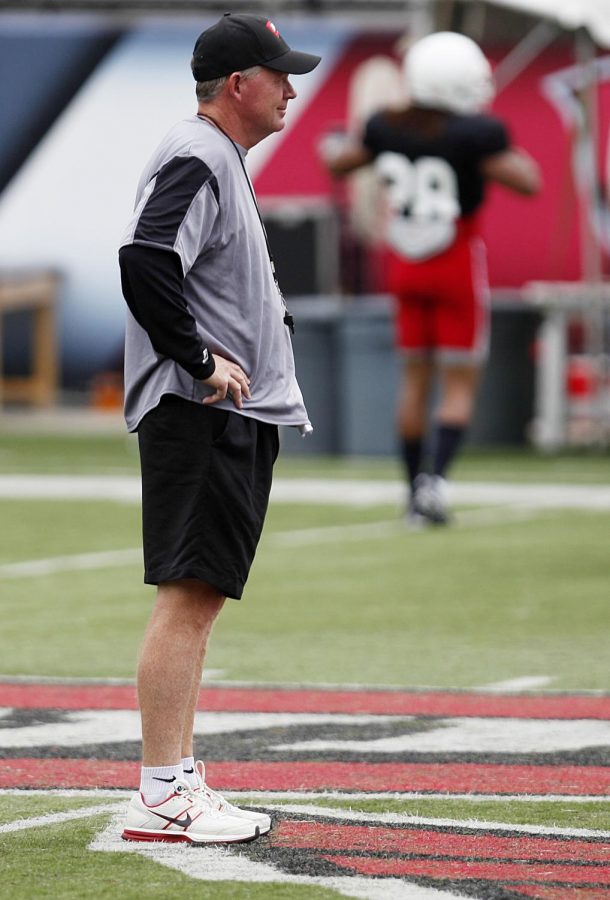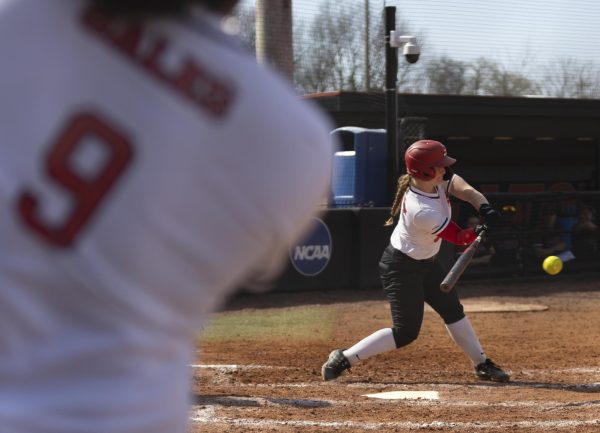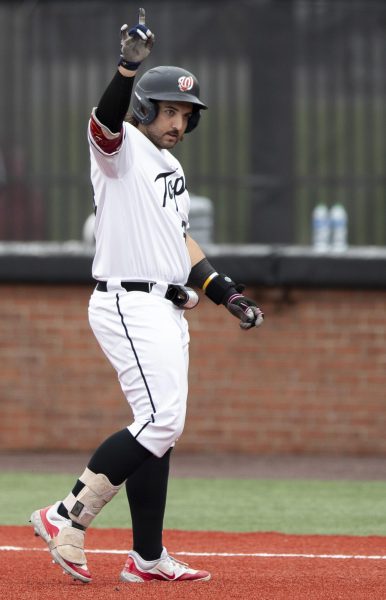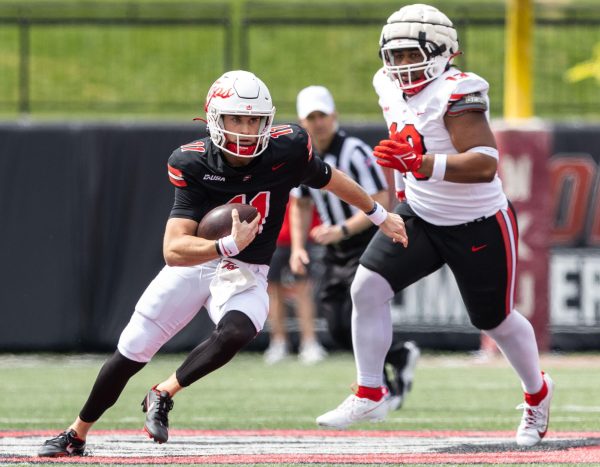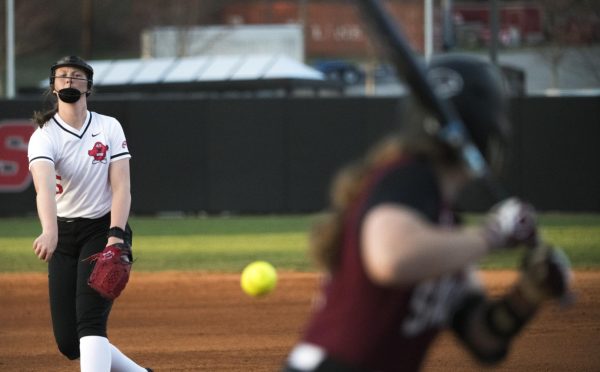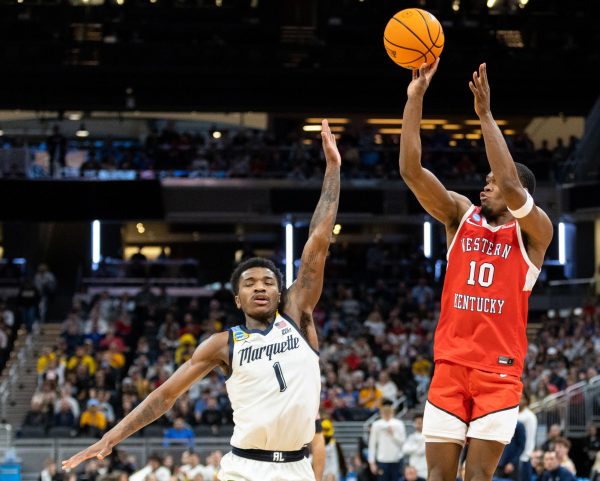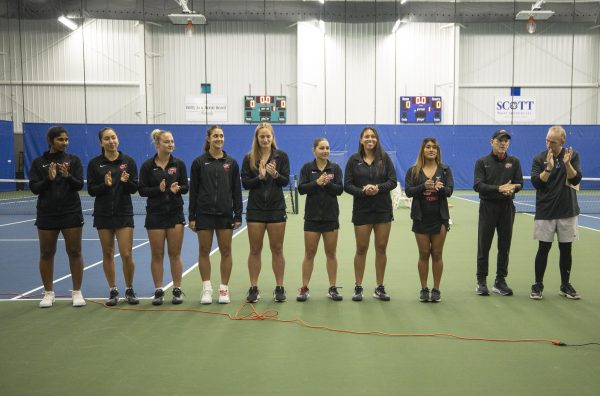Bobby Petrino’s road to the Hill
August 30, 2013
In 2004, President Gary Ransdell stood inside the corridor of a shambled football stadium that cried for a transformation. Water erosion and broken concrete had become a never-ending challenge for a structure that, in three years, would see a facelift to help take the program to the next level.
The athletics department later made the decision to use $37 million of private funds to add another side to the newly-endowed Houchens Industries L.T. Smith Stadium.
For a football program to compete in Division I-A football in 2007 at a high level, this was an absolute mandatory measure. A school that boasted an annual football budget that edged just over $3 million a year was willing to make all the necessary moves to eventually compete at the Football Bowl Series level rather than remain a stagnant program in Division I-AA.
Another football program was adjusting to changes of its own 113 miles north of Bowling Green.
The University of Louisville was fine-tuning the machine conducted by a coach that would take its product to a level higher than it had ever envisioned.
His full name is Robert P. “Bobby” Petrino.
At the time, no one could guess that over the next eight years Petrino would produce a 75-26 head coaching record, make a bowl appearance in all of those eight years – including three Bowl Championship Series games – and establish himself as one of the biggest faces of college football.
Fast forward to Dec. 10, 2012, eight years from the days when slippery-when-wet signs tattooed the halls of Smith Stadium and eight years from the time Petrino was making a name for himself among college football’s elite coaches.
WKU was looking for a football coach, and Bobby Petrino was looking for a job.
The abrupt departure of former WKU coach Willie Taggart led Athletics Director Todd Stewart to fill the void with his No. 1 target — he ended up making one of the biggest coaching hires of the year.
On that cold and cloudy Monday after- noon in the new Jack and Jackie Harbaugh Club atop Smith Stadium, Stewart introduced Bobby Petrino as the 18th head foot- ball coach of the WKU Hilltoppers.
The Journey
It was 11:38 p.m. — they both remember the time.
Todd Stewart took a shot in the dark and sent a text message to Petrino on Dec. 7, just hours after coach Taggart had accepted the same position at the University of South Florida.
At first, Stewart wanted to wait and call Petrino the next day, but he made the choice to go ahead and swing for the fences that night.
“I’m not really a patient guy,” Stewart said.
At 11:43 p.m., Stewart’s restlessness paid off in surprising fashion.
“He texted back and was like, ‘Yes, absolutely I would love to talk to you about the job,’” Stewart said. “I thought to myself, ‘Well, that’s encouraging.’”
For Bobby Petrino, coaching football was, is, and always will be his greatest passion — behind caring for his family, he said.
Football’s really the only thing he’s ever known because it’s always been the family business — his father and brother spent time coaching as well.
But if he had never had the chance to call the shots on the field, Petrino said he would have been fine with settling down with a job with a little less stress.
“I was a good milkman in my days in college,” Petrino said. “I would have continued to work for Ed McHugh at Clover Leaf Dairy in Helena, Mont. For four years I worked the dock, and the fifth year I had to take a route.”
Carroll College in Helena, Mont., is where it all began for Petrino — or, you could say, the Petrinos.
Petrino played for his father, Bobby “Putter” Petrino Sr., whose legend of 26 seasons of coaching and 15 conference titles only adds to idea that a winning trait may be hereditary in the Petrino household
Putter gave Petrino his offensive coordinator job at Carroll College in 1985, managing the Fighting Saints offense to the top of the NAIA for two seasons. The offense was led by a quarterback named Paul Petrino — Bobby’s younger brother — a four-year starter for Carroll.
The dairy business with Ed McHugh may have worked out, but there were better plans for Petrino.
He got his first shot after an interaction with John L. Smith, who was an assistant at the University of Montana while Petrino’s father was at Carroll College.
All he had to do to get Smith’s attention was be himself: a Petrino.
“My knowing of Bobby was more about my knowing of his father and how good a coach he was,” Smith said. “So when he was applying with me (at Idaho) I heard from people saying things like ‘Yeah, you got to take a look at Petrino because he’s a Petrino.’ That’s kind of how it all came in to being of him and I hooking up at Idaho.”
When Smith was named the new coach at the University of Idaho in 1989, Petrino knew about it before Smith even left his current job at the time with Washington State.
Smith said, “It’s really kind of funny because of the way that took place. I had more or less talked to, interviewed and applied with the people at Idaho. We’re in Hawaii playing in the Aloha Bowl, and I had gotten a special delivery letter from Bobby that read, ‘I know you’re going to be the next head coach at Idaho and I’d love to come work for you’…and this was way before anything was ever publicized. I remember looking at my wife and saying, ‘Wouldn’t it be funny if this kind of worked out this way?’”
It all came to fruition when Petrino joined Smith as the quarterbacks coach at Idaho and was promoted to offensive coordinator within a year.
Smith was the real gateway to Petrino’s jump start into the coaching ranks.
Smith represented more than a mentor to Petrino on the sidelines.
As with most assistant coaches, leaping from job to job can be a necessary, uncomfortable lifestyle to work up to being a head coach at some point. Petrino made nine stops before landing the head coach title at Louisville, but has been with Smith at four jobs up until now, whether working as an assistant under Smith, or vice versa.
“As an assistant, he’s part of your family, he’s part of your group and that’s the way you have to be in the coaching profession,” Smith said. “We were together long enough that my daughter baby-sat his kids. It’s just a part of the family, that’s what you do.
“…It’s been a great, great relationship that we’ve had — either he working for me or I working for him, so I love him like a brother…He treated me like gold.”
When Smith left Louisville to take over at Michigan State in 2003, Louisville Athletics Director Tom Jurich made the choice to bring Petrino back to the Cardinal sidelines. It was a quick decision, and he was clearly qualified because of his family history.
“The thing I always look at is he came from a football coach’s family,” Jurich said. “His father was a very, very successful and highly regarded head coach, and I think Bobby learned by osmosis there. I think people that live in those situations, they have a foot up on a lot of people because they have so many experiences at the dinner table.”
Like any long journey worth travelling, a few bumps in the road may appear along the way. For Petrino, those rocky paths have followed him to a few destinations.
Just one year into his first head-coaching job at Louisville in 2003, Petrino spoke with Auburn about its head coaching position. He flirted with other teams while still with the Cardinals. Then after signing a 10-year contract, he bolted to the Atlanta Falcons of the NFL less than six months later.
Petrino left the Louisville program in 2007 on a high note: the Cardinals won the Orange Bowl after a 12-1 season, and the program’s success under Petrino helped Louisville — then a member of Conference USA — earn an invite to the former Big East Conference.
The relationship between Petrino and Jurich goes back when he was at Arizona State while Petrino was at Idaho, both schools being in the Big Sky Conference. Despite Petrino leaving the Bluegrass for the Peach State, Jurich said he didn’t blame Petrino for chasing the dream of coaching at the next level.
“Was I disappointed he left? Absolutely because I really thought we were doing something special,” Jurich said. “I think the continuity would have carried over and done great things, but I mean, who in the heck is going to stand in the way of you going to take your dream job in the NFL? Obviously, a 20/20 in hindsight says you don’t take it, but who would really know at that time? I would have done the same thing if I was Bobby.”
If the famously-adopted acronym for the NFL being “Not-For-Long” stands true, Petrino can testify.
Just 13 games into his first season in Atlanta, he left a note in the team’s lockers letting them know he had accepted the head coaching position at the University of Arkansas. The Falcons were 3-10 at the time.
The Southeastern Conference, where the fandom is as wild as a random “Calling of the Hogs” in Fayetteville, Ark., is the cream of the crop when it comes to NCAA football conferences, and Petrino was now in a position to contend for national titles.
Arkansas improved in each of his four years at the helm. The Razorbacks’ only two losses in 2012 came against LSU and Alabama — those teams later faced each other in the NCAA National Championship.
A win at the 2012 Cotton Bowl put the Razorbacks as the No. 5 team in the NCAA at the end of the year, with a serious chance to contend for a national title the following season.
Petrino was on top of the world in college football, but it all came back down to Earth later that year.
The coach was involved in a motorcycle crash in April 2012. Though he initially said he was alone, it was later revealed he had been with former Arkansas volleyball player Jessica Dorrell, who had recently been hired to work for the Arkansas football program.
In hindsight, the motorcycle crash may have saved Petrino and his family. When Arkansas fired its successful coach for lying about being alone in the crash, it showed Petrino the blessings he took for granted.
In an interview with ESPN’s Joe Schad four months after the crash, Petrino opened up to emotionally express that he had wandered from the value he held most dearly — his family.
“All I know is I wasn’t thinking and I wasn’t acting correctly,” Petrino told Schad. “It’s not how I was raised, it’s not how I raise my children. I take responsibility for it, and I really am sorry. I have played it over and over in my head a million times. How could I do this? How could this happen? And not just the hiring. Or that day. But my actions, my behavior — for months it was just wrong.”
For the first time in around 30 years, Petrino would not walk the sidelines of a football field that fall. Critics still hang the scandal over his head today.
But at 11:38 p.m. on Dec. 7, Todd Stewart sent a text message — a message reaching out and willing to let Petrino’s résumé outweigh the baggage.
The Family
The Arkansas scandal reminded him of a moral he was raised under: family first, then football. Any efforts made to get back in to coaching would be based first and foremost on what was best for his family.
He hoped that some athletics director would trust he had changed, and Todd Stewart was that man to give him a second chance.
With college football’s most famous and passionate fans reigning in cities with universities in larger conferences, WKU is a different story.
Petrino is quick to note that Bowling Green is different.
“The people have been great to me and my family and our coaching staff,” Petrino said. “It’s been awesome for us. My daughter and my grandchildren are here which is great. I have another daughter and a son that are up in Louisville going to school so there’s plenty of trips back and forth for us, another son going to school here, so it’s been a great deal…
“I’ve been in a lot of college towns, and I really enjoy that. Anywhere I’ve been where the majority of the people are homegrown — I guess you could say — it seems like they welcome you with open arms. It was certainly that way in Louisville. It’s that way here in Bowling Green. I’ve been able to make some really good friends and some great relationships, and I’m just looking forward to continue to building.”
Family completes Petrino, according to Smith and others. When he’s on the field, he surrounds himself with loved ones. Petrino brought along from Arkansas his son-in-law, L.D. Scott, as the defensive ends coach for WKU.
It’s not uncommon to find his daughter and grandchildren in the stands during practice and Petrino can turn from aggressive coach to loving grandfather with the flip of a switch. On a Saturday during spring camp, WKU was hosting several recruits on campus. During a halftime break from a scrimmage, people from all over the Hill could hear Petrino yelling at staff members to hurry up the process.
While Petrino was shouting aggressive instruction, his granddaughter was making her way over to see the coach. Like night and day, Petrino turned from angry coach to lovable grandfather.
“They’ve probably got a nickname for me,” Petrino said. “They just call me ‘Coach.’”
His grandchildren, Stevie Nicks, NCIS reruns, and his wife Becky’s lasagna are a few of his favorite things that have nothing to do with a pigskin. He usually keeps quiet and is a reserved man whose reputation on and off the field has kept the media talking for years.
His history of jumping from job to job and his affair with an employee he hired as an assistant at Arkansas provide a cloud that has and will follow him throughout his career. John L. Smith said his dismissal from Arkansas was a “fall in the road” to show Petrino what he really needed.
“If you see him out with his grandkids — and I’m sure you have — he needs the family around him.” Smith said. “Sometimes, we need to have that fall in the road to realize how much we need the people around us and I’m sure it’s a situation that he looked at and said, ‘Boy, I need my family and I will do anything I can do to get them back.’”
Keeping family together reaches outside the lines of blood for Petrino. During his year of absence from the sideline in 2012, Petrino leaned on others in the business for advice to bounce back from the fall. He even went back to his former boss at Louisville.
“The thing I really wanted Bobby to do was own it,” Jurich said. “He gets an A-plus in my book for doing that. He’s really worked hard, he’s made mistakes and he’s going to learn from them…He’s going to be a much better husband, a much better father, and a much better coach.”
Petrino was indeed open and up front with Todd Stewart. If he wasn’t, he still may be looking for a job.
He wasn’t just open to Stewart, though, WKU’s athletics director said — he’s been open to Bowling Green.
“He goes out in restaurants all the time, he’s very available, he likes it when people come up and talk to him, he goes to a lot of sporting events on campus,” Stewart said. “He is very much of a presence, and I think that’s how people relate to him.”
Show Time
Bobby Petrino hasn’t had a week like this in 20 months. The last time he planned for a game was January 2012, when his Arkansas Razorbacks defeated Kansas State in the Cotton Bowl.
But his approach is a bit different now. He can now relate to the lyrics of an old, familiar tune of the citizens of the Commonwealth where “by and by hard times come a-knocking at the door.” Now, Petrino is back in his old Kentucky home.
The coach isn’t the only one excited about the fresh start, according to Jurich.
“I know as we talked through the whole situation prior to him taking the Western job was that he wanted Becky and the family to be comfortable and excited about it,” Jurich said “Once they were, he was totally on board.”
WKU has bought into Petrino, and he has bought into WKU.
That triangle needs a top, and Petrino said the team is working on building a product to get the fans excited.
“The first thing we have to do is put a great product on the field,” Petrino said. “Get some players that the fans can really identify with, making it exciting and energized. Everyone likes the style of play that we have and it’s our job to build the fans.”
It’s been nine months since the eruption of cheers and a spontaneous “Go Tops” welcomed Bobby Petrino to the Hill in the Jack and Jackie Harbaugh Club for his introductory press conference.
If hundreds of people can show up for a press conference to welcome Bowling Green’s newest celebrity, then the coined phrase of “show time” is only appropriate for the year that lies in front of WKU.
Six years ago, the program was in a one-sided stadium in the Gateway Conference and was in desperate need of a change. Bobby Petrino was in need of a change, and now everything has changed at WKU.
“For our fans, it validated how serious we are about being successful at the I-A level,” Stewart said. “We can do 10 more coaching searches and not have a résumé like Bobby Petrino’s.”

